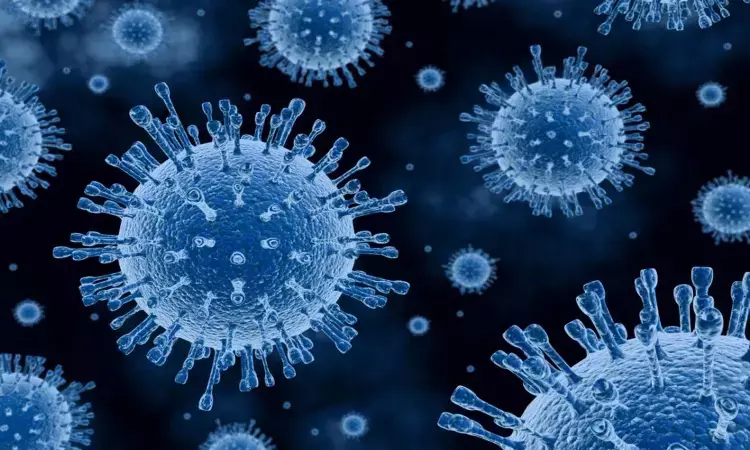- Home
- Medical news & Guidelines
- Anesthesiology
- Cardiology and CTVS
- Critical Care
- Dentistry
- Dermatology
- Diabetes and Endocrinology
- ENT
- Gastroenterology
- Medicine
- Nephrology
- Neurology
- Obstretics-Gynaecology
- Oncology
- Ophthalmology
- Orthopaedics
- Pediatrics-Neonatology
- Psychiatry
- Pulmonology
- Radiology
- Surgery
- Urology
- Laboratory Medicine
- Diet
- Nursing
- Paramedical
- Physiotherapy
- Health news
- Fact Check
- Bone Health Fact Check
- Brain Health Fact Check
- Cancer Related Fact Check
- Child Care Fact Check
- Dental and oral health fact check
- Diabetes and metabolic health fact check
- Diet and Nutrition Fact Check
- Eye and ENT Care Fact Check
- Fitness fact check
- Gut health fact check
- Heart health fact check
- Kidney health fact check
- Medical education fact check
- Men's health fact check
- Respiratory fact check
- Skin and hair care fact check
- Vaccine and Immunization fact check
- Women's health fact check
- AYUSH
- State News
- Andaman and Nicobar Islands
- Andhra Pradesh
- Arunachal Pradesh
- Assam
- Bihar
- Chandigarh
- Chattisgarh
- Dadra and Nagar Haveli
- Daman and Diu
- Delhi
- Goa
- Gujarat
- Haryana
- Himachal Pradesh
- Jammu & Kashmir
- Jharkhand
- Karnataka
- Kerala
- Ladakh
- Lakshadweep
- Madhya Pradesh
- Maharashtra
- Manipur
- Meghalaya
- Mizoram
- Nagaland
- Odisha
- Puducherry
- Punjab
- Rajasthan
- Sikkim
- Tamil Nadu
- Telangana
- Tripura
- Uttar Pradesh
- Uttrakhand
- West Bengal
- Medical Education
- Industry
New AI diagnostic can predict COVID-19 without testing

Researchers at King's College London, Massachusetts General Hospital and health science company ZOE have developed an artificial intelligence diagnostic that can predict whether someone is likely to have COVID-19 based on their symptoms. Their findings are published today in Nature Medicine.
The AI model uses data from the COVID Symptom Study app to predict COVID-19 infection, by comparing people's symptoms and the results of traditional COVID tests. Researchers say this may provide help for populations where access to testing is limited. Two clinical trials in the UK and the US are due to start shortly.
More than 3.3 million people globally have downloaded the app and are using it to report daily on their health status, whether they feel well or have any new symptoms such as persistent cough, fever, fatigue and loss of taste or smell (anosmia).
In this study, the researchers analysed data gathered from just under 2.5 million people in the UK and US who had been regularly logging their health status in the app, around a third of whom had logged symptoms associated with COVID-19. Of these, 18,374 reported having had a test for coronavirus, with 7,178 people testing positive.
The research team investigated which symptoms known to be associated with COVID-19 were most likely to be associated with a positive test. They found a wide range of symptoms compared to cold and flu, and warn against focusing only on fever and cough. Indeed, they found loss of taste and smell (anosmia) was particularly striking, with two thirds of users testing positive for coronavirus infection reporting this symptom compared with just over a fifth of the participants who tested negative. The findings suggest that anosmia is a stronger predictor of COVID-19 than fever, supporting anecdotal reports of loss of smell and taste as a common symptom of the disease.
The researchers then created a mathematical model that predicted with nearly 80% accuracy whether an individual is likely to have COVID-19 based on their age, sex and a combination of four key symptoms: loss of smell or taste, severe or persistent cough, fatigue and skipping meals. Applying this model to the entire group of over 800,000 app users experiencing symptoms predicted that just under a fifth of those who were unwell (17.42%) were likely to have COVID-19 at that time.
Researchers suggest that combining this AI prediction with widespread adoption of the app could help to identify those who are likely to be infectious as soon as the earliest symptoms start to appear, focusing tracking and testing efforts where they are most needed.
Professor Tim Spector from King's College London said: "Our results suggest that loss of taste or smell is a key early warning sign of COVID-19 infection and should be included in routine screening for the disease. We strongly urge governments and health authorities everywhere to make this information more widely known, and advise anyone experiencing sudden loss of smell or taste to assume that they are infected and follow local self-isolation guidelines."
For more details click on the link: DOI: 10.1038/s41591-020-0916-2
Hina Zahid Joined Medical Dialogue in 2017 with a passion to work as a Reporter. She coordinates with various national and international journals and association and covers all the stories related to Medical guidelines, Medical Journals, rare medical surgeries as well as all the updates in the medical field. Email: editorial@medicaldialogues.in. Contact no. 011-43720751
Dr Kamal Kant Kohli-MBBS, DTCD- a chest specialist with more than 30 years of practice and a flair for writing clinical articles, Dr Kamal Kant Kohli joined Medical Dialogues as a Chief Editor of Medical News. Besides writing articles, as an editor, he proofreads and verifies all the medical content published on Medical Dialogues including those coming from journals, studies,medical conferences,guidelines etc. Email: drkohli@medicaldialogues.in. Contact no. 011-43720751


